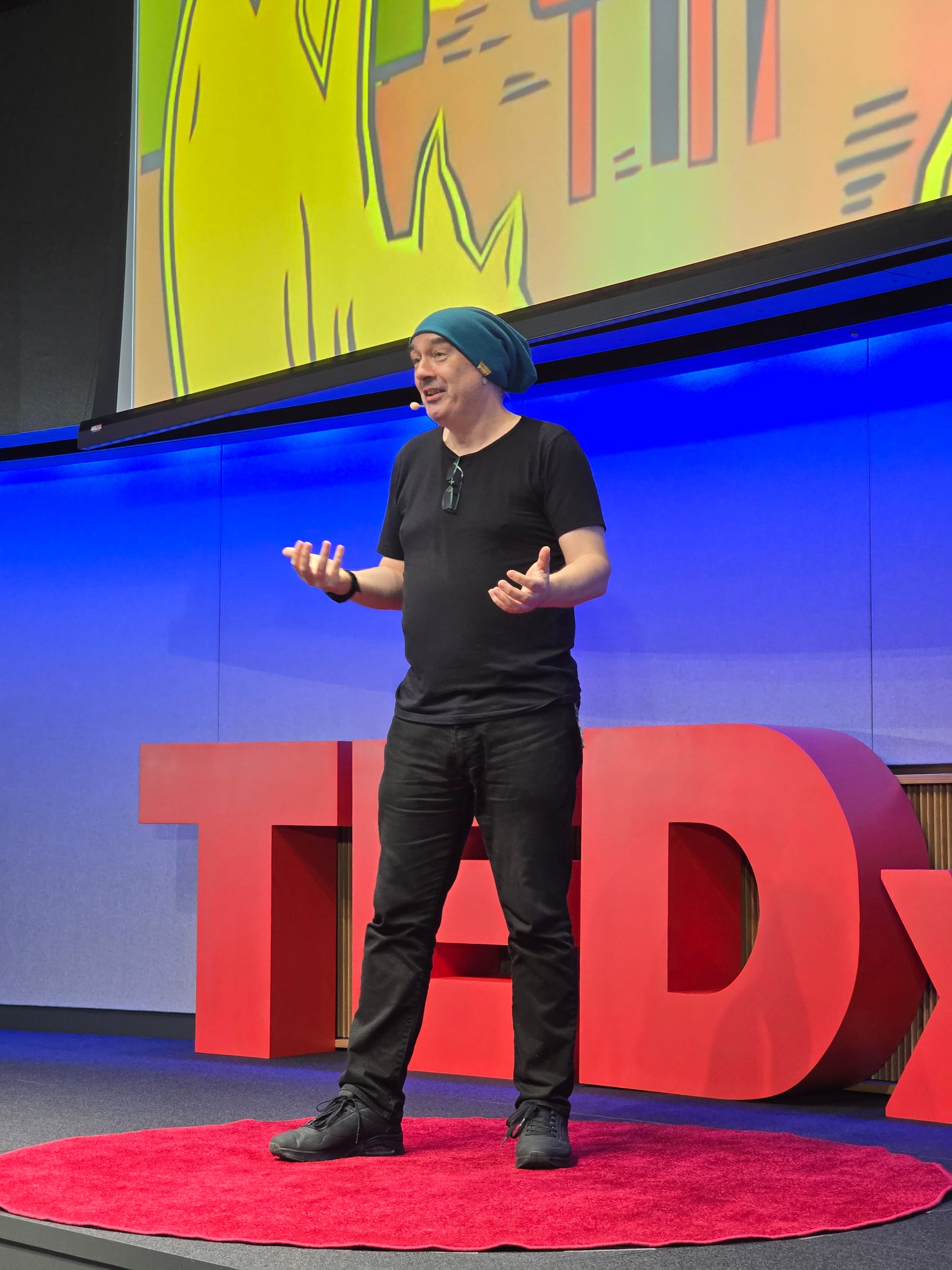From Excuses to Applause: My Journey to the TEDx Stage in Zurich

Standing in front of the bright red TEDx letters, heart thumping, spotlight warming my face, I realised something: this wasn’t just a talk. It was the end of a long, sweaty climb and the view from the top was incredible.
Giving a TEDx talk is one thing. Preparing for one? Whole different beast.
When I first agreed to speak at a TEDx in Zurich, I figured the hardest part would be writing something worth listening to. I was wrong. The real challenge was trimming the truth into 12 minutes without losing the soul of the story and then rehearsing it so many times I could hear my own voice in my dreams.

The talk itself centred on a moment I’ll never forget. Early 2020. Bleary-eyed, heading to work, I glanced in the bathroom mirror. It has one of those flattering lights that usually makes you look ready for your movie close-up. Not that day. The magic light was giving up.
Years of sneaky snack logic had taken their toll. My blood work was a mess, I was overweight, and my doctor had been gently (then not-so-gently) warning me I was edging toward an early grave. But I had a ready excuse for everything. “I’m getting older.” “At least I exercise.” “The Mona Lisa’s crumbling too.”
Then COVID hit. Suddenly, headlines started shouting: “This virus is gunning for people just like you!” My denial couldn’t keep up. Lockdown gave me space to think, and when I looked in the mirror again, I didn’t see age or natural decline. I saw a slow-motion car crash powered by my own daily choices.
That realisation lit a fire. I changed everything. Out went the sugar and processed junk. In came daily walks, green vegetables by the truckload, and homemade lunches eaten without a laptop glowing in my face. The weirdest part? I liked it. My body responded so quickly it felt like magic. Weight dropped. Energy surged. The mirror showed a healthy me, really quickly. Suddenly I could see what I had been, where I couldn't before the spark was finally lit.
But that’s not what the talk was really about.
The real story was about why I ignored all the signs for so long. And the answer? Self-delusion. Sneaky, stubborn, wildly convincing self-delusion. The kind that tells you everything’s fine when it’s clearly not. The kind that makes you shrug in the mirror and say, “This is just getting older,” while quietly speeding toward disaster.
We all do it. We all justify things we shouldn’t. And it’s not always bad, some positive illusions help us take on challenges we might otherwise avoid. (Mild self delusion might simply be called optimism). But there’s a line between self-belief and self-betrayal. We can do terrible things to ourselves by ignoring those behaviours that absolutely have to change.
That’s where the QUEST framework came in -> a little tool I built to help spot and dismantle those sneaky justifications:
- Question your own narratives
- Uncover external perspectives
- Examine repeated excuses
- Sense emotional dissonance
- Think like your future self
It’s simple, uncomfortable, and sometimes life-saving.
Sharing that on stage in Zurich was surreal. The talk was raw, personal, and more vulnerable than anything I’ve ever done in front of an audience. But the response? Electric. People came up afterwards with their own stories, quiet realisations, confessions, commitments to change.
And that, really, is the magic of TEDx. Not the lights or the applause, but the shared recognition. That flicker in someone’s eye when they realise, “I do that too.”
So yes, preparing this talk took months of edits, run-throughs, rewrites, self-doubt and plenty of help from my speaker coaches. But I’d do it all again in a heartbeat. Because stepping onto that stage wasn’t just about telling a story. It was about owning it. And maybe... just maybe... helping someone else do the same.
To everyone facing their own mirror moment: don’t wait for a crisis. Start your QUEST now. Remember to rinse and repeat too. That realsisation wasn't the last crazy excuse I ever made to myself.
And to those dreaming of their own TEDx stage: it’s a mountain, sure. But the view from the top? Worth every step.
If you want to try the QUEST framework yourself, find a quiet place and think through the following thoughts. The topic will come to you automatically, in truth you're already spending energy denying the key problems.
🧭 The QUEST Framework: Spotting Self-Deception
🔍 Q – Question your own narratives
Are your beliefs objectively true, or are they just justifications?
🧑🤝🧑 U – Uncover external perspectives
What do trusted people see that you might be missing?
🔁 E – Examine patterns of rationalisation
Are you making the same excuses over and over again?
⚠️ S – Sense emotional and cognitive dissonance
Do guilt, anxiety, or defensiveness suggest you’re fooling yourself?
⏳ T – Think like your future self
Will today’s choices lead to regret—or to growth?
